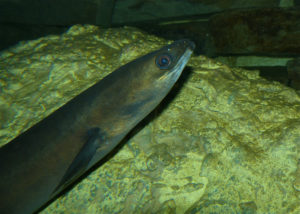October 17th – Explore Nature on Normandy Common in the Autumn
We had a fascinating walk around Normandy Common seeking and learning about the plants, fungi and birds we saw.
September 14th – The Secret Life of Eels
Speaker : Dr Kathy Hughes
Maybe it’s down to their unusual appearance, but eels have long been the subject of myths and prejudices, unfairly so. From the evil eels, Flotsam and Jetsam, in Disney’s The Little Mermaid, to tales of a magic eel in a New Guinea that will kill anyone that harms any animal in its lake. However, Dr Kathy Hughes, a freshwater expert from WWF, gave a fascinating and engaging Zoom talk which revealed the true beauty and wonder of eels.

There are roughly 800 species of eel, of which 16 are freshwater Anguillid eels, including the UK’s very own European eel. Found across Europe, this eel begins its life in the Sargosso Sea, in the Atlantic near North America, about 4,000 miles away from England.
The European eel has several life stages, but it only mates once in its life. The oldest recorded eel was 144 years old. They arrive in our rivers with a non-determined sex. Where there are fewer eels on the east coast of England more of them will become females, and where there are many on the west coast the sex ratio is skewed to males. Males tends to migrate from rivers at 20 years of age, females at around 70 years.
We know they travel up rivers, arriving from early spring, on the high moon tides. This is when elver fishers would be out trapping. Eels are not the best swimmers, particularly little elvers – compared to our other species such as Atlantic salmon or barbel.
Barriers such as weirs can cause eels problems, contrary to the myth they leave the river and go around obstacles, which in fact risks drying out. Instead, they need our help through installation of passes, such as eel and elver ladders. Other threats include over-fishing, illegal trade and pollution, all leading to a dramatic population decline. Eels and their habitats are protected through the EU Water Framework Directive and EU Eel Directive. Many conservation groups are working towards their protection including monitoring and research, and restocking.
You, too, can help eels through your local Rivers Trust or Wildlife Trust. And if you see a fish in distress call the Environment Agency Emergency Incident Hotline on 0800 80 70 60.
March 9th: Nocturnal animals
Speaker: Dr Mike Berwick of the Wildlife Aid Foundation
February 10th: Return of the Peregrine
Speaker: Keith Betton, Chairman of the Hampshire Ornithological Society, writer and broadcaster
January 13th: In Tune with Nature’: how to make a wildlife garden with bee, butterfly and bird-friendly plants
Speaker: John Negus, a photojournalist who regularly contributes to BBC gardening programmes
